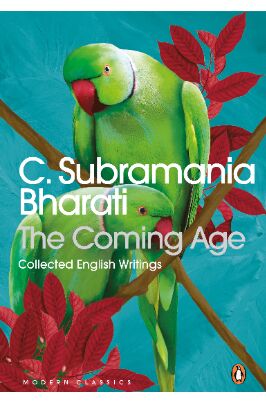Victimising segregation?
The Coming Age is a collection of C Subramania Bharati’s original writings in English across genres; skilfully edited by Mira T Sundara Rajan, the book portrays Bharati’s unique perspective on a vast multitude of subjects; Excerpts:

'Four Varnas were made by me according to variations of character and work.' The Gita says this, and it specifies the occupations and traits pertaining to each Varna. Everyone knows what they are. I may be permitted to call this Chaturvarnya (Four Varna) system by the name of 'the Gita theory of society', although it is well known that the same ideal is upheld in most of the ancient writings. I do so for convenience. The Gita theory may, or may not, promote the highest interests of man. It was never tried in its pure form, or, if it was, history tells us nothing about it. As a hypothesis, it is one of the best and the most attractive. At least, some of us think so. But the caste law is leagues away from the Gita theory. For the Brahmanas have long ceased to make Vedas and Shastras; they have long ceased to think seriously of eternal verities or the sciences of this earth. They have totally forgotten the meaning of the older and purer writings. They adopt all professions. They are cake sellers, railway clerks, and police constables. And their general intelligence and character are naturally on a level with their pursuits. The Kshatriyas have long ceased to govern.
The Vaishyas and Shudras have followed the great chaos. They are honest, but they are very ignorant and downtrodden, very far indeed from performing their duties as prescribed by the Gita ideal of society. And, instead of the four Varnas, you have four thousand castes. And you sometimes quote ethnology, eugenics, hydrostatics, and whatnot, to support these four thousand castes! But, alas, the ignorant masses of our country have been made to believe that this caste chaos is a special divine gift to our country and whosoever transgresses it has to go to hell. It is this belief more than anything else that makes people insensitive to the injurious results of caste. If you really have your justification in ethnology or hydrostatics, then you have been cheating people during all these centuries by telling them a different story. No science can justify cheating.
The sole remedy is in inter-dining and inter-marrying. The others are mere quack remedies of an anaesthetic character. There are many difficulties in the way of applying this remedy on a large scale. One very real difficulty is the fact that many members of the purely vegetarian sects cannot physically endure the smell of flesh and fish at a distance of five yards. But the vegetarian votaries, consisting of both Brahmins and non-Brahmins, can marry among themselves. There is no rational excuse for not doing that. I repeat, there are many, but not insuperable, difficulties in the way of applying that remedy. But there is no other remedy that the human mind can think of.
Sometimes people who seem half-inclined to admit the injustice and futility of caste suddenly turn around and shout: 'But they have similar prejudices in South Africa, North America, and Oceania.'
If other people are fools, that is no reason why we should be such. If others today are thoughtless by committing the mistake that we committed many centuries ago, and become much degraded in consequence thereof, it is our duty to warn them. But we ought not to make it an excuse for failing to rectify the mistake for which we have been so signally punished by the laws of Nature.
'But the masses of people are quite content,' say some. 'It is only the intellectual classes that are always harping on this old grievance. From Buddha to Vivekananda, many have been the sages who condemned this chaos. But it persists. It is in the blood of the Indian people.' I reply that the people are not contented. That is proven by the very fact that, for these two thousand and five hundred years, great ones have again and again risen from the ranks of the people and condemned this caste in no measured language. During these two thousand and five hundred years, it has lost most of its saving features. Little vitality is now left in it. The form remains with a shadow of life and a million bad wounds on it. Let none rejoice that caste takes a long time in dying, for its life will be all the ghastlier for that.
Who knows? Who knows that the Brahmanas may not purify themselves by the waters of knowledge and then recognize that no caste can be irredeemably impure? Who knows that the other castes which have been out-Heroding Herod, the castes which are fonder of their chains than the Brahmanas themselves—that even they may not behold the vision of the age and proclaim democracy? If only the Brahmanas of today will read aright the signs of the times, then they will see that Democracy, far from being a thing to be dreaded, will be as great a joy to them as to any other class. The three watchwords of France—Liberty, Equality, and Fraternity—when fully understood by men, will really prove to be the highest guides of human evolution.
(Excerpted with permission from C Subramania Bharati's and Mira T Sundara Rajan's The Coming Age; published by: Penguin)



